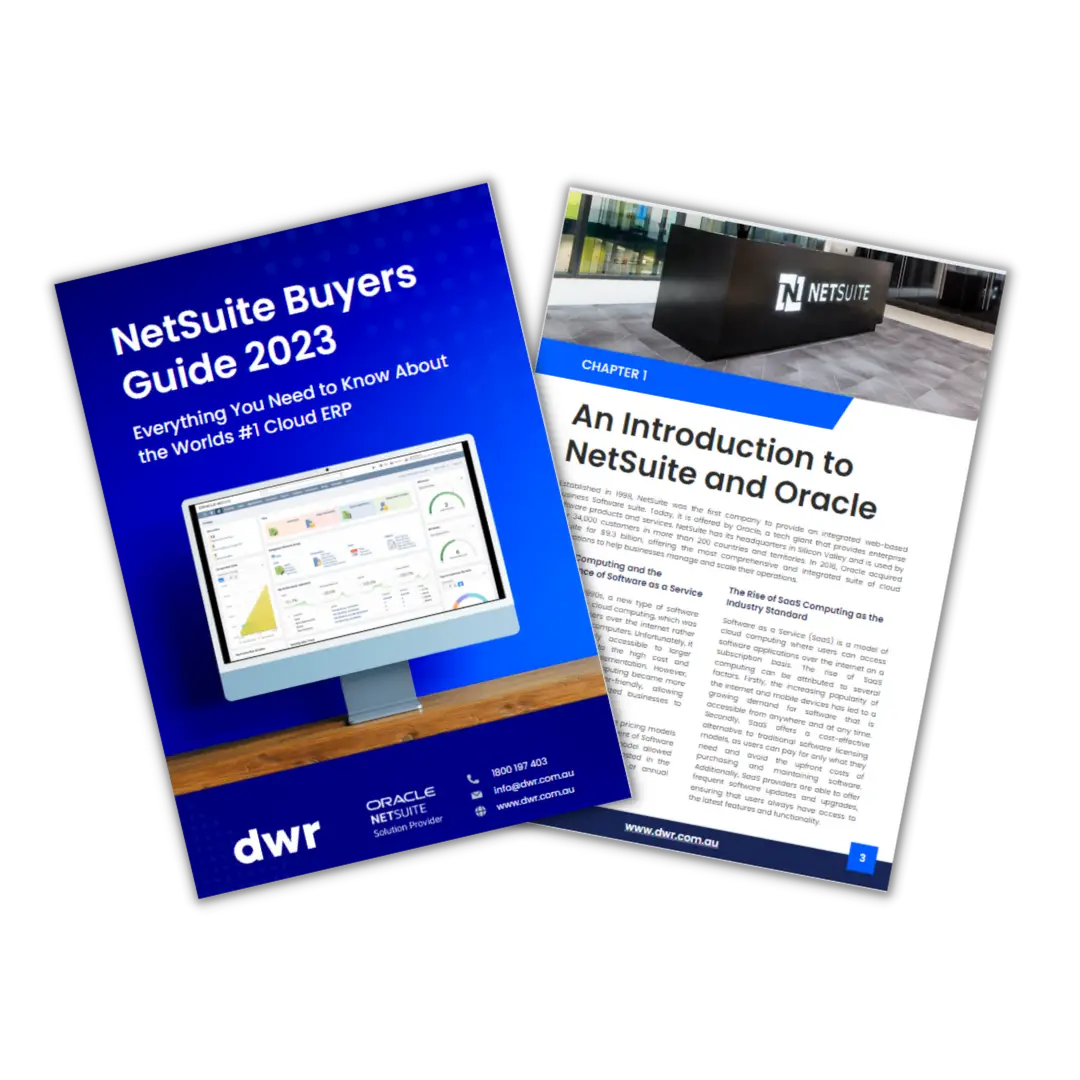```html
Modern Hotel ERP systems can enable your hotel group to streamline processes and gain real-time insights into the performance of your operations. It can also provide automated, real-time analytics, helping you to make informed decisions quickly and efficiently.
However, selecting the right ERP system and implementing it successfully requires careful consideration and specialist expertise. You want to make sure that you're making the right decisions for your business, but how do you know where to start?
This guide is designed to help CFOs of hotel groups successfully implement the latest ERP systems, like NetSuite for Hospitality. Here, we will explore the benefits of hospitality systems and discuss some of the key considerations when selecting an ERP solution for your company. We will also look at how DWR can help you take full advantage of NetSuite's Advanced Reporting Software for Hospitality Businesses.
The Need for ERP Systems in Hotel Groups
Having a hotel group business can be both complex and rewarding. Unfortunately, the large quantities of data that come with running a hotel group business can sometimes become overwhelming. Aside from manual processes, it can be difficult to stay on top of data such as inventory, customer information, billing, and more.
Implementing an enterprise resource planning (ERP) system can go a long way towards addressing these challenges. An efficient ERP will help you to manage the different aspects of your hotel group business from a single platform. This provides better visibility into the operations of each hotel in your group and helps you to make informed decisions quickly.
An ERP system also helps automate many operations and streamlines processes that would otherwise have been done manually. This makes it easier to keep track of bookings, guests, payments, staffing levels, service delivery records and more - all in real time.
Benefits of Implementing ERP Systems in Hotels
Implementing a Hospitality Enterprise Resource Planning (ERP) system can help hotel groups to become more efficient, reduce costs, and improve customer satisfaction. ERP systems provide a comprehensive set of tools for data and resource management, which can be used to optimise many aspects of a hotel's operations and help it to remain competitive in the ever-changing hospitality industry.
Hospitality ERP software can be used to streamline processes such as inventory management, purchasing and sales, financial reporting and budgeting, customer service and support, and HR management. By automating many of these processes, ERP systems can significantly reduce manual effort and errors that often arise from manual data entry. This helps hotel groups to save costs related to labour expenses and errors in reporting.
Finally, a Hospitality ERP system can help hotel groups stay competitive by providing up-to-date insights into trends in the hospitality industry so they can better adjust their strategies accordingly.
Understanding the Costs and ROI of ERP Systems for Hotels
It's important to understand how much of a financial commitment implementing an ERP system may require prior to taking the plunge. Many enterprises find it helpful to create model budgets, use case studies, and a cost/benefit analysis as they weigh their options.
When estimating the costs and ROI of ERP systems for hotels, there are a few key factors to consider:
Subscription fees: The upfront money you will need to pay for access to the software
Implementation fees: The money you will need to pay for the implementation process, such as training and data migration
Maintenance fees: The money you will need to pay for ongoing maintenance of the system
Training costs: It's important to ensure that all staff members with access to the system are trained on properly using it
Customisation costs: Depending on the size of your hotel group, customisation may be necessary to meet specific needs
Integration costs: If you plan on integrating third-party applications with your ERP system, additional subscription fees may apply.
By making sure you are aware of all the associated costs upfront and calculate a realistic ROI estimate before beginning, you can ensure that investing in an ERP system is worth it in the long run.
Selecting the Right ERP System for Your Hotel Group
Choosing the right ERP system for your hotel group can feel like a daunting task. But armed with the right knowledge and advice, you can make an informed decision that will transform your business and set you up for success. Here are a few key factors to consider when selecting an ERP system:
Your Business Needs: Find the Perfect ERP Solution
As every hotel group operates differently, finding an ERP solution that perfectly meets your business's specific needs and goals is paramount. That's where NetSuite ERP for Hotels comes in, providing a powerful platform for hotel groups seeking total operational integration and real-time visibility across their chain.
Seamless Integrations: A Unified View of Your Business
Don't settle for a fragmented view of your business operations. Check out the integrations the ERP provider offers and ensure they align with your needs. NetSuite ERP for Hotels delivers the goods, with integrations with leading reservation systems, POS solutions, customer loyalty management apps, and other hotel management software. That way, you can have a truly unified view of your entire business through one integrated solution.
Scalability & Flexibility: Adapt and Conquer
Your business is ever-evolving, so your ERP platform should be too. NetSuite's cloud-based architecture ensures scalability, flexibility, and agility, allowing you to respond quickly to changing trends in the industry and seize new opportunities as they arise without disrupting service levels or availability.
Preparing Your Business for an ERP System Implementation
When making the decision to invest in an ERP system, it is critical that your hotel group takes the necessary steps to prepare for a successful ERP system implementation.
First, you should make sure that the selection process is thorough, and that the ERP system you select has been designed specifically for the hospitality industry. Also, you should consider what integrations will be required by your business to ensure that all of your systems are interconnected and operate effectively as one platform.
You also need to consider what data you currently have and what data needs to be migrated into your new ERP system. This includes customer information, customer loyalty programs, inventory and reservations data etc. A specialist NetSuite Solution Partner can advise on the best approach for migrating this data safely and securely.
Finally, it’s worth having a plan in place for training staff on how best to use the new system during and post-implementation. A comprehensive training program will ensure staff understand how to use the features of their new system effectively, maximise efficiency and get up-to-speed as quickly as possible.
Making the Most of Your ERP System in the Long-Term

Once your ERP system has been implemented, there is still work to be done to ensure that you are making the best use of its features. Continuous improvement and optimisation strategies can help you make the most of your ERP system in the long-term. Here are a few strategies you can implement to get the most out of your system:
Automation
You should identify any processes that can be automated with the help of your ERP, such as reporting requirements and customer support. Automation can save you time, reduce manual errors and help ensure consistent data across departments.
Regular Updates
As new features become available, take time to review them and see how they could benefit your business. Regular updates also help keep your system secure from hackers and other cyber threats.
Staff Training
Make sure that staff understand how to use the ERP system properly and efficiently, so they can get the most out of its features. You may want to consider organising regular training sessions or workshops for staff members so they can stay up-to-date on any changes or updates in the system.
The Wrap Up
In conclusion, businesses in the hospitality industry can benefit immensely from implementing ERP solutions, such as NetSuite ERP for Hotels. Such solutions can help streamline and automate day-to-day operations, as well as improve visibility into overall hotel performance. With the right tools and support, hotel groups can transform their business and become more efficient, cost-effective, and profitable.
By leveraging the latest ERP systems, hospitality businesses can improve their competitive edge while maximising their return on investment. With the right partner, like DWR, implementing a NetSuite ERP system can be a successful and rewarding endeavour. Get in touch with DWR today to find out how we can help your business transform with the latest ERP solutions.
```
.svg)

